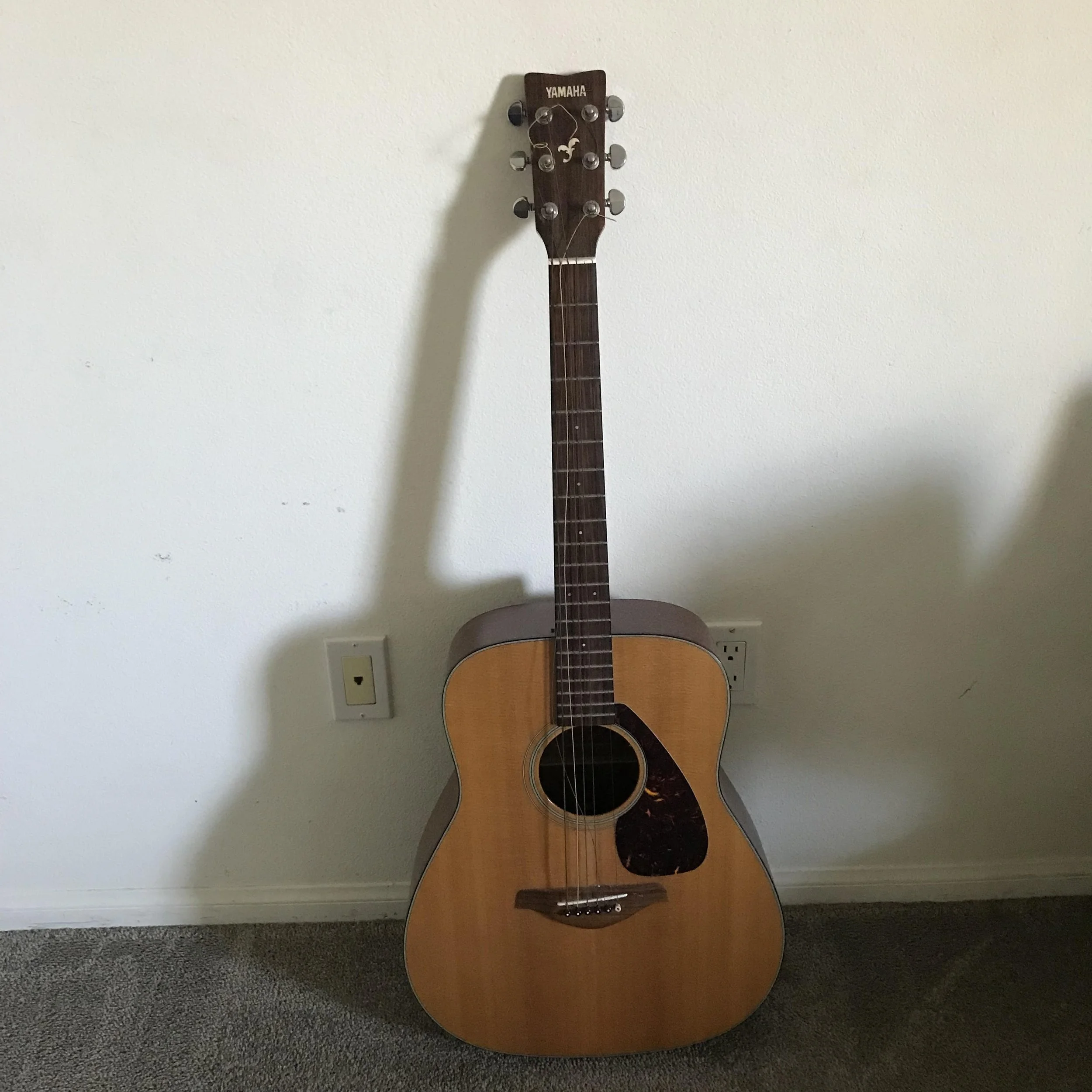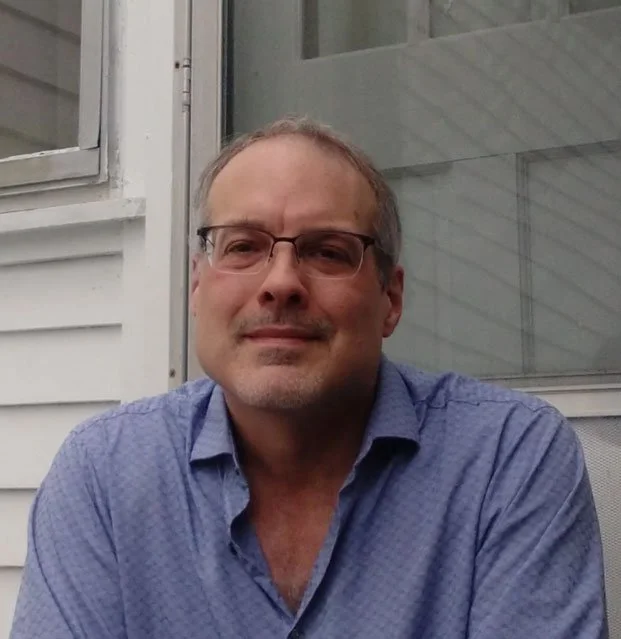"Revenant" by Kenneth Gulotta
Revenant
Now and then a fine flake of gravel rose to Clayton’s scalp, a feather’s edge below the skin’s surface. Usually, he could catch a corner of it with the tip of his fingernail and pry it out. Nina said it was disgusting, but he thought it would be more disgusting to leave it there: a piece of the street, just stuck there, marinating in the flesh of his head like a foul seed. Planted with a cracked and bleeding fingertip, it would send its roots ever downward, never sprouting into the light.
Besides, why would he want to leave the crumbs of that night within himself? Everything he had been good at was now a taunting picture: his former self, holding a guitar, gloating, scorning this new, feeble, moving body. He hated both of them, old and new.
* * *
Learning to play the guitar hadn’t come easily to him. He knew people who just seemed to pick up an instrument one day and play it well the next: those men and women of many coats in oversized bands, playing jazz or folk or some mixture, moving from place to place and device to device over the course of a night. That guy Les in that ragtime band had jumped from guitar to keyboards to accordion to fiddle. Once, he even hauled out a harp—not a harmonica, an actual, full-size harp.
Or those people who just picked up new styles of music in half an hour: heads
tilted to the side, listening to two or three bars of a bluegrass piece, and then just jumping in, their guitars twanging like banjos, even though, until that day, the only banjo they’d ever heard had been the one in the theme song to The Beverly Hillbillies.
No, it wasn’t like that for him. He studied. Playing scales until the tips of his
fingers tingled and burned. Learning the shapes of chords, piece by piece, putting them
all together. And even then, it wasn’t like that stuff translated into pure music for him:
each time he learned a new song, he had to study just as hard.
He had built himself, brick by brick. He had built a rock guitarist, nothing more,
nothing less.
* * *
First, they grabbed his guitar. He remembered that much: he was walking from the Two Rings Club on one of those crooked, angled side streets that branched off the turnabout, trudging through two a.m. toward his car, and before he felt anything hit him, the handle of his guitar case tore from his hand, feeling like it was taking a finger or two with it. (It didn’t. Later, in the hospital, he checked. His index finger was scraped, but it was still whole.)
He reached for the case, instinctively, barely aware of the man as a peripheral blur, young, old, whatever, and his head snapped forward into static, his neck tingling,
and he pitched down hard onto one knee, realizing it only when a sharp rock stabbed
upward into it and pain crackled up through his thigh and hip.
He started to rise, but the man who had grabbed his guitar case now held it by one end and swung it like a cartoon cricket bat at his face, the hard plastic shell that had cost him extra thumping and letting off a muffled thump as it hit his cheekbone and snapped his face to the side. He fell back, and before he could lift his head, the other man, the one behind him, lifted it for him, and slammed it back down into the brittle, crumbling pavement, among the glass and cigarette butts. He saw the man’s face upside-down, his beard a halo of hair above an unnaturally narrow forehead, his hair an eerily thin beard around an alien, wide chin.
Clayton’s head was yanked up and slammed down again, and the man’s creature face flickered red and black, like a film negative washed in blood and soot, and then it went blank, disappeared.
Much later, in the hospital, when he could talk again, and he said that the second attacker had slammed his head backwards in the pavement two times, the doctor said, “Well, the evidence says — from what we see, it was probably more than that. He just — there’s more damage than that.”
* * *
At the Two Rings, when your band booked a gig, the manager Harry, a Grizzly Adams, ex-biker type with a fallen Santa gut, forced you to choose three songs from a list of eighteen covers that he knew. When you played, he took the stage at the end of the show, so your last three songs of the night were devoted to backing up a drunken recitation of classic rock anthems.
That was what Clayton was doing the hour — thirty minutes, even — before the flickering man slammed his head some number of times into the cracked stone pathway. Playing the chords of “Proud Mary” while a Nightmare Claus slurred “rolling” over and over again.
* * *
“You just have to put it behind you,” Nina said. “I know that’s a bullshit thing to say, and saying it doesn’t do a thing to help you do it, but that’s where we are: you just have to.”
“I can’t fucking put it behind me — I don’t have anything else to put here so that it can go behind.”
“You’re not making sense.”
“I can’t make sense! Don’t you get it? I can’t make sense anymore.”
“You have to start trying! You have to see someone new who can help. We can go see someone new.”
“What kind of someone?”
“I don’t care! Surgeon. Social worker. Therapist. It doesn’t matter! Just
someone.”
Clayton touched the back of his head. His eyes drifted to one side, as if he was
controlling them with some lever hidden beneath his hair, his scalp.
“You have to at least try,” Nina said. “Can’t you try, at least?”
* * *
For several weeks he went to the scene during the day to look at the remnants of his blood. The silhouette, in the shape of a rough face melting in tendrils to the left, grew darker and darker as his blood grew older. Then the rains started, an hour or so each afternoon, washing at his blood until one day it was indistinguishable from the rest of the stains around it.
Nina talked on the phone to her mother. “Better,” she said brightly, crisply. Then, in a lower tone, she said, “As best I can tell, better.”
* * *
One day he went back to the scene and stood, staring at the spider-snarl of cracks where his blood had been. Finally, he found one of the cleaner pieces of broken glass near the base of the brick wall next to the sidewalk and sliced a red line across his palm. He squeezed his hand above the sidewalk, letting off a trickle of new blood into the dust where his old blood had faded. Later, when Nina asked about the cut, he said he had caught his hand on the point of a knife while washing dishes, reaching into a sink full of utensils and soapy water. He had washed the dishes specifically so that he would have something to tell her.
* * *
He tried to play the new guitar Nina’s mother had bought him for Christmas. His fingers went between the strings, missing all the notes. He made muffled clicks, the chitterings of the thing he had become.
* * *
“I think we should open the scalp, debride the wound — just generally clean you out,” the doctor said, glancing at Nina as he spoke. “If there’s material in there, under the skin, it could be causing general problems with healing, as well as some difficulty with, well, coping.” He spread his hands. “Honestly, I think we got everything out, but you never know. So, if you want, we can try again. Just kind of, you know, take another look.”
“Would you be putting me under for that?” Clayton asked, leaning forward. He
was sitting sideways on the examination table, his fingers twitching against the tissue-
paper covering, plucking at imaginary strings as his feet kicked feebly, dangling below,
running uselessly in the empty space. “Would I be unconscious?”
“Oh, we don’t have to knock you out for this,” the doctor said. “We’ll just give
you a local, and you won’t feel a thing.” He waited, and then he said, hesitantly,
“Unless — do you — unless you want to be unconscious?”
“I think I do,” Clayton said. “I think — I don’t want to be conscious.” He looked at
Nina and said, “What I want — I definitely want to be just unconscious.”
Nina’s face crinkled momentarily, but then reasserted itself as her face. As Clayton watched, though, part of it around one of her eyes kept crinkling, just melting off to one side in wisps that faded away.
Kenneth Gulotta
Kenneth Gulotta writes fiction and poetry while earning a living as a technical writer. He has an MA in creative writing from the University of Texas at Austin and a PhD in English from Tulane University. He lives in New Orleans with his wife and stepson. His fiction has been published in SEEMS, Soundings East, Litro Online, Saranac Review, and Dunes Review, and he has a story upcoming in the Queen's Quarterly.
Headshot: Kenneth Gulotta
Photo Credit: Staff


